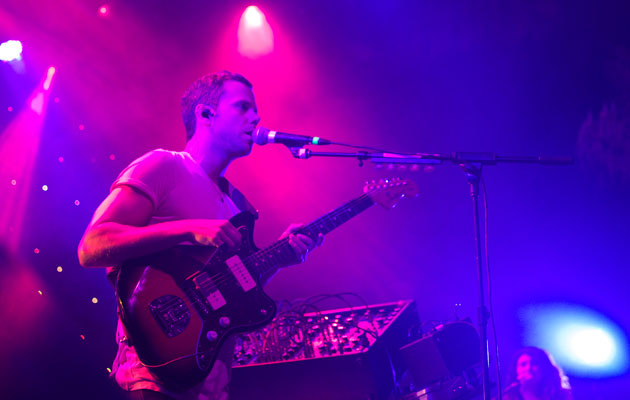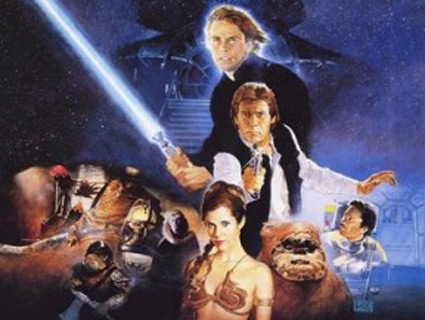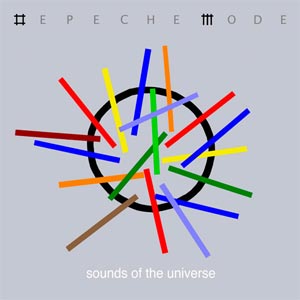 M83 at the Fillmore on April 22. Photo: Katrina Pagaduan
M83 at the Fillmore on April 22. Photo: Katrina Pagaduan
Anthony Gonzalez’s music has been called “celestial, epic, and astral,” and it’s no wonder. The charming 31-year-old behind synthpop group du jour M83 is quite the science-fiction nerd. He grins sheepishly as he recalls the late-’70s and early-’80s sci-fi flicks whose soundtracks helped inspire M83’s lush, grand sonic persona. He even uses space analogies, and speaks of music as a portal. “The only way I found to reconnect with my past was to write songs about my childhood and my teenage years,” Gonzalez says.
Growing up in on the French Riviera in the ’80s, he fell in love with music and began playing guitar and later keyboards—he studied piano as a lad—but his career would take a while to germinate. Over more than a decade, Gonzalez made five M83 albums, and scored tours with the Killers and Depeche Mode. But his big break came just late last year, when his latest, Hurry Up, We’re Dreaming, debuted at No. 15 on the Billboard 200 and hit No. 1 in the US Dance/Electronic category. His single, “Midnight City,” topped Pitchfork’s list of the year’s top 100 tracks, beating out Adele, tUnE-yArDs, and Kanye West. This momentum landed M83 a major slot at Coachella this year, and the current tour has sold out in advance. Luckily, I scored a pass for one of the very first shows, at The Fillmore in San Francisco. In his backstage dressing room, clad in dark jeans and a fitted white T-shirt showing off his muscular physique, Gonzalez told me about his sci-fi fandom, his need to overproduce, and the scary part about making music in an era when anyone with a laptop can do it.
Mother Jones: Are you happy with people’s response to the new album?
Anthony Gonzalez: The new album is not that new anymore. [Laughs.] I have so much things to say about this album. This is the first time that I feel like people are interested my music in more than 10 years. It’s just fantastic, because two years ago, when I started to work on the album, I had no idea what to expect. I knew it was a risk, because nowadays the industry is all about singles and not about albums anymore. Putting out a double album is dangerous. But the response from the fans and the critics are just truly amazing. I’m super proud. I’m super happy.
MJ: I’ve heard you talk about how making this one was a particularly joyous experience. Does this have anything to do with your recent move from Antibes to Los Angeles?
AG: Well, that’s I think the best thing I’ve done in these last five years. I was happy in the south of France, but I think I was overprotected. I felt like moving to LA was also a way for me to put myself in danger in a way, because I’m nothing here, and I have everything to prove. And the music scene in LA is truly inspiring. I felt alive again. And I think you can feel that on the album.
MJ: M83 has been around since 2001. How has its musical direction evolved?
AG: I always feel like I’m growing up. I’m adding more experience. I’m a different person with different expectations. I don’t feel like this album is a betrayal to the very first albums, but it’s evolving—at least in the way I want it to evolve.
MJ: You’ve described it as an homage to the Smashing Pumpkins, whose Mellon Collie and the Infinite Sadness you found inspirational. What makes this album of your unique from the others?
AG: I went further in terms of soundscapes and instrumentation. This is the first time that I’m using different kind of instrumentation, like acoustic guitars and strings and brass and saxophone. Even if I’ve always tried to push my limits, I think this one is definitely the most choreographed.
MJ: You named M83 after a galaxy, Messier 83. Why that one in particular?
AG: I don’t know. I was in college, at the library, and I fell in love with this picture. And the name was so simple. I was just 16 or 17 when I found the name. There’s nothing very interesting about this but there’s still this mystery of like, “What is it?” And it’s very far away from us. I’m still not bored of it yet.
MJ: You came upon this photo randomly?
AG: Yeah. I mean, I was obsessed with astronomy books and stars and space and black holes.
MJ: I’m sensing a love for science fiction.
AG: Yeah, definitely. I mean, you know, I grew up in the ’80s and the biggest movies at the time were E.T. and Star Wars. Also Star Trek. So yeah, for me it’s like a huge inspiration. I was also growing up watching a lot of Japanese animation. And all these animés were taking place in space. I feel like I was born in space, almost. This is kind of like an inspiration to my music.
MJ: Give an example.
AG: I don’t know if you know this Japanese series called Captain Harlock? And Galaxy Express 999. It’s the story of this kid who’s traveling in space on a flying train, going from planet to planet to find a mechanical heart so he can live forever. This animé was just amazing to watch as a kid because it was so beautifully drawn, and the story was so poetic and emotional. And the music on top of it was very orchestrated and very grand. Galaxy Express for me was a big inspiration.
MJ: So your music is nostalgic?
AG: It is. I’m a very nostalgic person. I know that I’ll never be able to go back in time. So the only way I found to reconnect with my past was to make music and to write songs about my childhood and my teenage years. I had the best childhood, ever. I was really happy. My parents did a great job. This album is kind of a tribute to them, too.
MJ: What are some of the best memories these songs bring back?
AG: I grew up in Antibes, this small town by the sea between Nice and Cannes. It was just a very quiet town, the perfect town growing up. I was living in this small apartment, but there were these gardens where all the kids from the apartments would gather and play. It was just like great summer nights and great friends. And very close to my family, to my cousins. It was just the perfect thing. But I feel like when you’re a kid you have no problems. Everything is taken care of by your parents and you don’t have to worry about anything. They’re the captain of the space ship. I feel lucky because [we weren’t] a rich family, but for my parents we were the most important things.
MJ: Does it feel different when you visit as an adult?
AG: It feels very different. I still miss it. But I spent like 29 years of my life in this town, so I’m kind of tired of it at the same time. I really needed to discover new things.
MJ: You’ve called composer Jean-Michel Jarre as an early inspiration.
AG: I’m lucky, because I have a brother four years older. When I was 10, he was 14 and started to listen to a lot of German music from the ’70s like Ash Ra Tempel and Tangerine Dream, amazing bands like this. I always say that my music is just a reflection of my influences. I never invented anything. My music has been done before. What I think I have that’s special is this combination of influences which makes my sound. Thanks to my brother I’ve been able to listen to tons of great bands at a very young age.
MJ: How old were you when you started playing?
AG: I started to play piano when I was like five, six years old. I was such a brat and into soccer at the time so I would skip all my piano lessons. Music wasn’t for me yet. I waited until I was like 10, 11, when I started to play guitar and fall in love with piano again.
MJ: And the synthesizer, which is a staple of your sound now; when did that enter the picture?
AG: That’s when I saw Jean-Michel Jarre on TV. I asked for a synthesizer for Christmas, and I had this very cheap synthesizer. It was great. It was the sound of the future to me.
MJ: You’ve talked about how you have one or two favorite synthesizer models that you like to work with, because their sounds are consistent with the sound that’s a part of you. Describe that sound.
AG: It’s all about layers with me. Layering stuff and never stop. I would never do a track with just a bass, guitar, drums, and vocals. It’s impossible to me. I have to overproduce it. I think this is exactly what makes my sound. These layers of textures. I’m trying to pay attention to details. For me, every synth part has a place in my mix. For me it’s building this wall of sound that’s going to provide the emotion for my music.
MJ: What other bands have you been in?
AG: I started to play in a band when I was 14, a shitty blues band. It was terrible. I was always playing in bands until M83.
MJ: How did M83 come about?
AG: My very first interesting band was a three-piece band. Our name was My Violin Wish. It was very Sonic Youth inspired and My Bloody Valentine and those kind of bands. We stopped making music together because I wanted to focus on something more electronic. I was collecting keyboards for two, three years, and I started make music in my bedroom, and this is how M83 started. I sent this demo, when I was like 17 or 18, to this Parisian label, and they asked me to do an album with them. I felt so scared to do it by myself, so I asked my best friend, Nicholas, to do it with me. So we did the first two albums together.
MJ: How has the electronic music scene changed since you first entered it?
AG: It’s changed a lot, obviously, because of the technology. You can create and compose your album with just one computer, one laptop. Everything is getting more easy to achieve what you have in your head. I feel like we’re arriving at a point where if you want to make original music, it’s all going to be about what kind of styles of music you’re going to mix together. It’s impossible, unfortunately, to create something new anymore. It’s just like everything has been done before. You know. You’re a journalist. When you talk about one artist, you compare them to other artists. That’s the way it is nowadays. You can’t escape that.
I feel like now music is accessible to nonmusicians, almost, and everybody can make an album. It’s like a jungle. There’s so many releases every week. Sometimes you wonder, “In two years, when I’m going to release my new album, am I still going to interest people?” because there’s so much to listen to nowadays. So it’s exciting and completely fascinating but also scary. I still love to do albums the old fashioned way, where you use a little bit of technology but you stay true to the albums you loved when you were a teen and the way they were recorded, so I’m still very nostalgic about the spirit of that. But I love technology.
MJ: Is it true that after this tour you’ll be taking a break?
AG: Hopefully. [Laughs.] But I’m not going to stop making music.
MJ: You’ve hinted at wanting to make a full-length soundtrack.
AG: Yeah. I’m going to make a soundtrack. It’s probably going to be the next album.
MJ: What’s the film?
AG: I can’t talk about it now. Not yet. But it’s going to be taking place in space.
Click here for more music coverage from Mother Jones.
















